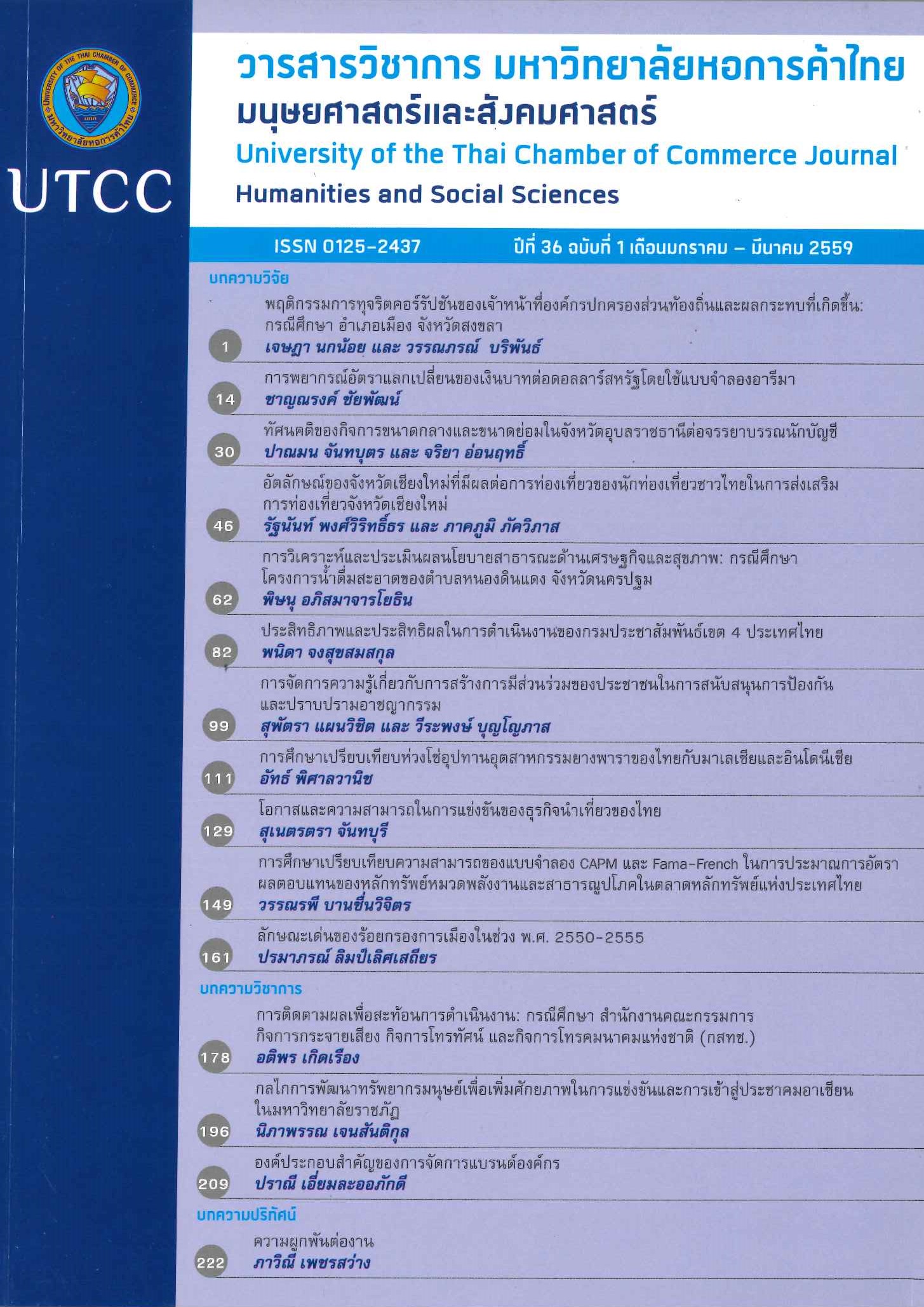Work Engagement
Main Article Content
Abstract
This paper aims to review the literature related to work engagement, which is receiving increased academic and business attention at present. The topics in this paper include the origin and the measurement of work engagement used widely. Additionally, whether or not work engagement differs from other organizational behavior factors has been debated in this paper. Moreover, the antecedents and consequences of work engagement are drawn from significant empirical studies and presented as a work
engagement model. Finally, the implication and suggestions, including case studies, for practitioners will prompt organizations to promote work engagement affecting job
satisfaction, organizational commitment and sustainable organizational growth.
Article Details
ลิขสิทธิ์ของบทความ
ผลงานที่ได้รับการตีพิมพ์ถือเป็นลิขสิทธิ์ของมหาวิทยาลัยหอการค้าไทย ห้ามมิให้นำเนื้อหา ทัศนะ หรือข้อคิดเห็นใด ๆ ของผลงานไปทำซ้ำ ดัดแปลง หรือเผยแพร่ ไม่ว่าทั้งหมดหรือบางส่วนโดยไม่ได้รับอนุญาตเป็นลายลักษณ์อักษรจากมหาวิทยาลัยหอการค้าไทยก่อน
References
Agarwal, U.A, et al. 2011. “Linking LMX, Innovative Work Behavior and Turnover Intentions: The Meditating Role of Work Engagement.” Career Development International 17, 3: 208-230.
Alarcon, G.M., and Lyons, J.B. 2011. “The Relationship of Engagement and Job Satisfaction in Working Samples.” The Journal of Psychology 145, 5: 463-480.
Alderfer, C. P. 1972. Existence, Relatedness, and Growth. New York: Free Press.
Bakker, A.B., and Bal, P.M. 2010. “Weekly Work Engagement and Performance: A Study among Starting Teachers.” Journal of Occupational and Organization Psychology 83: 189-206.
Barnes, D.C., and Collier, J.E. 2013. “Investigating Work Engagement in the Service Environment.” Journal of Services Marketing 27, 6: 485-499.
Buckingham, M., and Coffman, C. 1999. First, Break all the Rules: What the World’s Greatest Managers Do Differently [Online]. Available: http://keithdwalker.ca/wp content/summaries/d-f/First%20Break%20All%20the%20Rules.Buckingham.pdf.
Employee Engagement [Online]. 2015, May, 8. Available: http://www.banpu.com/employee_engagement.php (in Thai).
ความผูกพันต่อองค์การของพนักงาน [ออนไลน์]. 8 พฤษภาคม 2558. เข้าถึงจาก: http://www.banpu.com/employee_engagement.php
Federman, B. 2009. Employee Engagement: A Roadmap for Creating Profits, Optimizing Performance, and Increasing Loyalty. San Francisco: Jossey-Bass.
Freeney, Y., and Fellenz, M.R. 2013. “Work Engagement as a Key Driver of Quality of Care: A Study with Midwives.” Journal of Health Organization and Management 27, 3: 330-349.
Goffman, Erving. 1961. Encounters: Two Studies in the Sociology of interaction. Oxford: Bobbs-Merrill.
Hackman, J.R., and Oldham, G.R. 1976. “Motivation through the Design of Work: Test of a Theory.” Organizational Behavior and Human Performance 16: 250-276.
Hambleton, R. K. 2002. “Adapting Achievement Tests into Multiple Languages for International Assessments.” In A.C.Porter and A. Gamoran (eds.), Methodological Advances in Cross-National Surveys of Educational Achievement, pp. 58-73. Wshington, DC: National Academy Press.
Increasing Employee Engagement through HRM [Online]. 2015, May, 8, Avaliable: http://businesscasestudies.co.uk/harrods/increasing-employee-engagement-through-hrm/leadership.html#axzz3ZYHgPFa8.
Kahn, W. A. 1990. “Psychological Conditions of Personal Engagement and Disengagement at Work.” Academy of Management Journal 33, 4: 692-724.
Kahn, W.A. 2010. “The Essence of Engagement: Lessons from the Field.” In S.L. Albrecht (ed.), Handbook of Employee Engagement: Perspectives, Issues, Research, and Practice,
pp.20-30. Northampton, MA: Edward Elgar.
Klusmann, U., et al. 2008. “Engagement and Emotional Exhaustion in Teachers: Does the School Context Make a Difference.” Applied Psychology: An International Review 57: 127-151.
Koster, K. October, 2013. “Strategy Session.” Employee Benefit News: 10-11.
Kűhnel, J., Sonnentag, S., and Bledow, R. 2012. “Resources and Time Pressure as Day-Level Antecedents of Work Engagement.” Journal of Occupational and Organizational Psychology 85:181-198.
Kumnuwat, Banyat 2015. How to Create Employee Engagement for Business Success [Online]. Available: http://www.cpall.co.th/Blog/Detail/Banyat/ (in Thai).
บัญญัติ คำนูณวัฒน์. 2558. เราจะสร้างความผูกพันของพนักงานในองค์กร เพื่อผลสำเร็จของธุรกิจได้อย่างไร? [ออนไลน์]. เข้าถึงจาก: http://www.cpall.co.th/Blog/Detail/Banyat/
Lange, A.H., Witte, H.D., and Noelaers, G. 2008. “Should I Stay or Should I Go? Examining Longitudinal Relations among Job Resources and Work Engagement for Stayers versus
Movers.” Work& Stress 22, 3: 201-223.
Little, B., and Little, P. 2006. “Employee Engagement: Conceptual Issues.” Journal of Culture, Communications and Conflict 10, 1: 111-120.
Macey, W. H., and Schneider, B. 2008. “The Meaning of Employee Engagement.” Industrail and Organizational Psychology 1: 3-30.
Maslach, C., Shaufeli, W.B., and Leiter, M.P. 2001. “Job Burnout.” Annual Review Psychology 52: 397-422.
Maslow, A. H. 1970. Motivation and Personality. New York: Harper & Row.
Pitpokakul, Pisit 2015. Employee Engagement [Online]. Available: May, 8 http://www.impressionconsult.com/web/index.php/articles/226-employee-engagement.html
(in Thai).
พิสิทธิ์ พิฒน์โภคากุล. 2558. ความผูกพันของพนักงาน [ออนไลน์]. เข้าถึง จาก:http://www.impressionconsult.com/web/index.php/articles/226-employee-engagement.html
Saks, A.M. 2006. “Antecedents and Consequences of Employee Engagement.” Journal of Managerial Psychology 21, 7: 600-619.
Schaufeli, W.B., Bakker, A.B., and Salanova, M. 2006. “The Measurement of Work Engagement with a Brief Questionnaire: a Cross-National Study.” Educational and Psychological
Measurement 66: 701-716.
Timms, C., and Brough, P. 2013. “I Like Being a Teacher: Career Satisfaction, the Work Environment and Work Engagement.” Journal of Educational Administration 51, 6: 768-
789.
Vincent-Höper, S., Muser, C., and Janneck, M. 2012. “Transformational Leadership, Work Engagement, and Occupational Success.” Career Development International 17, 7: 663-
682.


